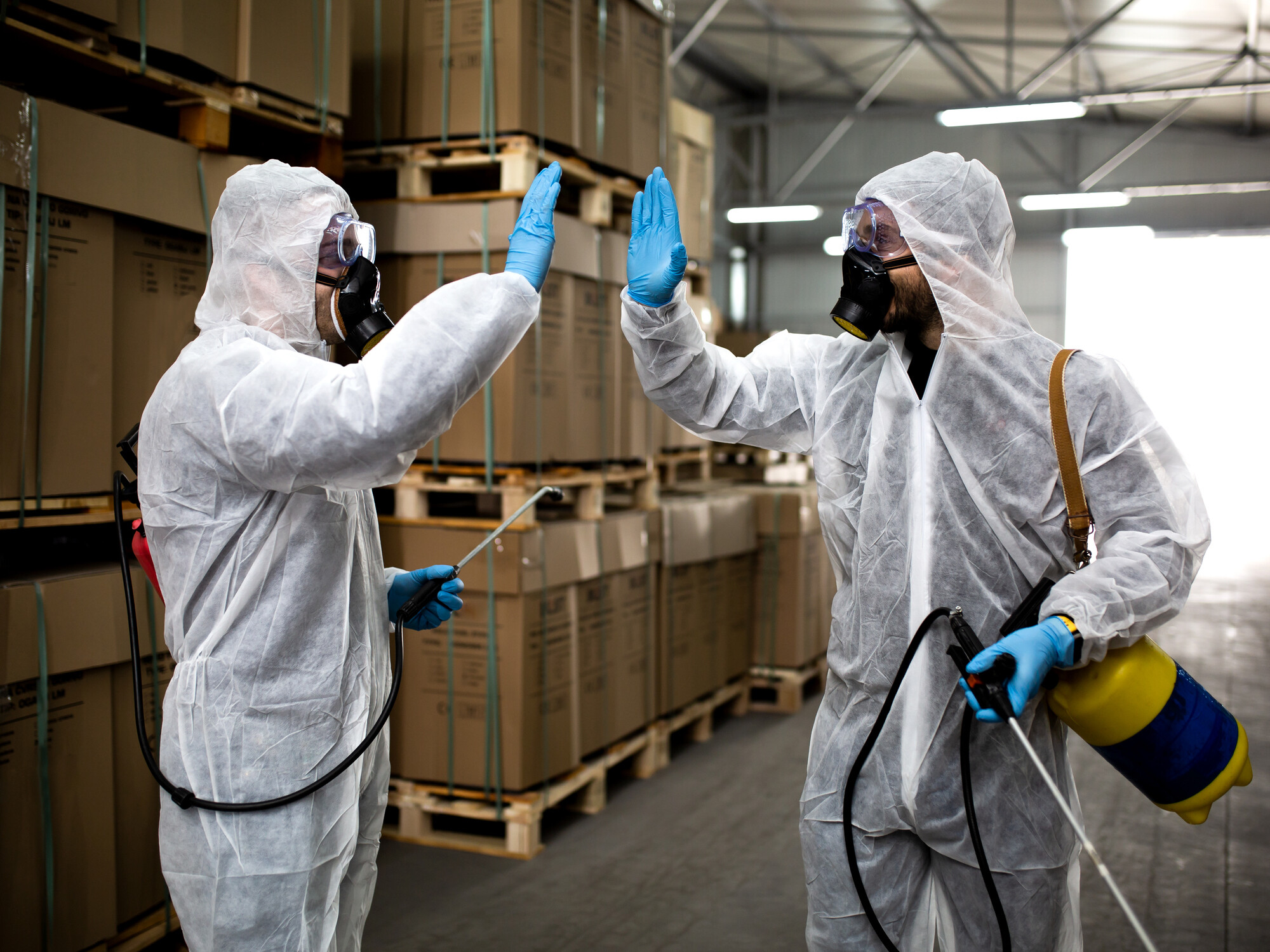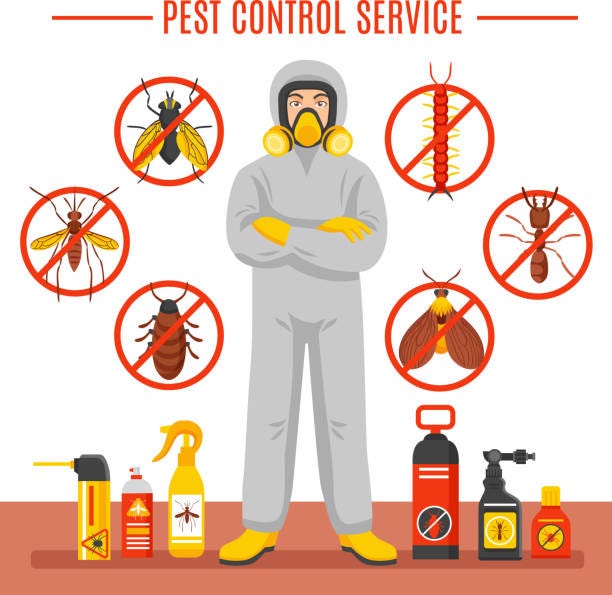Specialist Chicago Wasp Nest Removal: Important Services for a Pest-Free Property
Specialist Chicago Wasp Nest Removal: Important Services for a Pest-Free Property
Blog Article
Exploring Numerous Methods and Methods for Comprehensive Insect Control in Residential Spaces
The landscape of insect control in property rooms has actually advanced significantly, requiring an extensive understanding of numerous approaches that can be used for efficient management. Standard chemical therapies, while efficient, are increasingly being matched by eco-friendly alternatives and Integrated Parasite Monitoring (IPM) methods. Homeowners have to think about preventative measures, such as routine surveillance and accurate pest identification, to preserve a healthy and balanced environment. The real challenge exists in striking a balance between efficiency and safety and security-- an expedition that exposes the subtleties of each approach and its ramifications for sustainable living.
Comprehending Pest Control Fundamentals
Efficient parasite control is vital for keeping a secure and healthy living environment. Understanding the basics of bug control includes acknowledging the kinds of parasites that frequently get into domestic areas, the prospective risks they present, and the significance of preventative measures. Common home parasites consist of rats, insects, and various other unwanted creatures that can jeopardize health, damage residential property, and trigger wellness concerns.
A critical very first step in bug control is recognizing the particular bugs present. This can entail evaluating locations such as cellars, attics, and kitchen areas, where parasites are likely to grow. As soon as recognized, it is critical to understand their habits, reproducing cycles, and chosen environments, which can notify proper control approaches.
Preventive measures are basic to effective bug management. These include securing access points, keeping cleanliness, and minimizing clutter to eliminate concealing areas. Furthermore, correct food storage space and waste administration can dramatically decrease the allure of a home for parasites.

Typical Chemical Therapies
Amongst the different insect control approaches, typical chemical treatments have long been utilized to deal with infestations in household areas. These therapies generally entail the application of chemical pesticides designed to get rid of pests such as pests, rats, and other undesirable organisms. The effectiveness of these chemicals can differ, relying on the kind of parasite, the solution of the chemical, and the technique of application.
Common classes of traditional chemical treatments consist of pesticides, herbicides, rodenticides, and fungicides, each tailored to battle certain parasites. Insecticides, for instance, might target roaches, termites, or ants, while rodenticides are particularly developed to control rodent populations. These chemicals are commonly offered in numerous forms, including granules, lures, and sprays, allowing home owners flexibility in application.
Despite their performance, conventional chemical therapies raise worries relating to prospective poisoning to people, pet dogs, and useful organisms in the environment. As a result, it is essential for house owners to meticulously adhere to application standards and safety precautions to decrease risks. Integrated Bug Monitoring (IPM) methods can match these therapies, making sure an extra alternative strategy to pest control while making the most of effectiveness and security in domestic setups.
Eco-Friendly Bug Control Options
Environmentally friendly pest control choices are gaining appeal as homeowners seek more secure and more sustainable options to conventional chemical therapies. These techniques prioritize the health and wellness of both citizens and the environment, reducing the influence of bug control techniques.
One widely taken on green technique is the use of all-natural repellents derived from crucial oils, such as peppermint and citronella. company website These oils not only hinder insects but likewise give positive fragrances for indoor rooms. Diatomaceous planet, a powder made from fossilized algae, acts as an all-natural insecticide by damaging the exoskeletons of pests upon get in touch with, leading to directory dehydration.
An additional efficient technique entails promoting biodiversity in yards and backyards. Presenting beneficial bugs, such as lacewings and ladybugs, can naturally control pest populaces (Preventative pest control services Chicago). In addition, utilizing traps made from eco-friendly materials can help capture and remove bugs without creating injury to the community
Normal upkeep, such as sealing entrance factors and appropriate cleanliness, more enhances the performance of environment-friendly pest control. House owners can take positive steps to protect against invasions, making certain a much more sustainable living setting while efficiently handling pest-related concerns.
Integrated Pest Management Techniques
Executing integrated pest monitoring (IPM) methods offers an extensive technique to pest control that emphasizes prevention and lasting remedies. IPM incorporates several methods, concentrating on recognizing parasite actions, life cycles, and eco-friendly characteristics to minimize bug populations effectively. This diverse approach focuses on non-chemical techniques, such as biological control, habitat manipulation, and social methods, to decrease reliance on chemicals.
A foundational aspect of IPM is keeping an eye on and determining parasites precisely. This includes routine inspections and the establishment of action thresholds to identify when intervention is required. By recognizing the particular parasites affecting domestic settings, targeted interventions can be utilized, decreasing the likelihood of unnecessary pesticide applications.
By fostering a setting that dissuades parasite invasions-- such as sealing access points and handling moisture-- homeowners can significantly minimize the threat of pest troubles. With these strategies, IPM not just addresses existing parasite concerns yet also cultivates sustainable techniques that advertise lasting pest monitoring success.
Preventative Measures for Homes
To fend off potential bug problems, house owners must adopt a positive technique that emphasizes preventative procedures. This begins go right here with maintaining a well organized and tidy living room, as clutter and food particles draw in insects. Chicago pest control for restaurants. Frequently vacuuming, sweeping, and wiping down surfaces can dramatically minimize the threat of problems
Furthermore, securing entry factors is essential. House owners need to examine home windows, doors, and foundation splits for voids that can allow bugs access to the home. Making use of caulk and weather condition removing can efficiently obstruct these entryways.
Appropriate food storage is another important measure. Keeping food in impermeable containers and quickly tidying up spills or crumbs helps discourage rats and pests.
In addition, managing outdoor settings can protect against bugs from encroaching on property rooms. House owners should ensure that drainage systems are operating well, and landscaping is maintained neat. Cutting trees and bushes far from your house and eliminating standing water can even more lessen pest environments.

Final Thought
In final thought, effective bug control in residential areas necessitates a multifaceted strategy that incorporates typical chemical therapies with environmentally friendly methods and Integrated Insect Monitoring techniques. By focusing on preventative steps, such as maintaining tidiness and sealing entrance points, house owners can dramatically lower parasite events.
Recognizing the fundamentals of insect control involves recognizing the kinds of pests that typically get into household spaces, the possible threats they position, and the significance of precautionary actions.A crucial very first action in insect control is determining the details insects present. Integrated Insect Monitoring (IPM) techniques can complement these treatments, making certain a much more holistic strategy to pest control while maximizing efficacy and safety in household setups.
Carrying out integrated parasite monitoring (IPM) techniques supplies an extensive strategy to pest control that stresses avoidance and lasting solutions.In conclusion, reliable pest control in household spaces requires a complex method that integrates standard chemical treatments with green methods and Integrated Bug Monitoring approaches.
Report this page